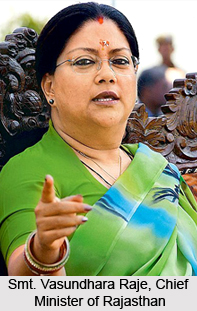 The amalgamation of 19 princely states and 3 chief ships once formed the state Rajasthan. Divided into 32 districts, Rajasthan happens to be the second largest state of India. Rajasthan has 25 parliamentary Constituencies and two hundred Assembly Constituencies. The legislature of Rajasthan is bi-cameral in form.
The amalgamation of 19 princely states and 3 chief ships once formed the state Rajasthan. Divided into 32 districts, Rajasthan happens to be the second largest state of India. Rajasthan has 25 parliamentary Constituencies and two hundred Assembly Constituencies. The legislature of Rajasthan is bi-cameral in form.
Rajasthan is today ruled by its first woman Chief Minister, Smt. Vasundhara Raje. The present ruling party is Bhartiya Janta Party ( BJP ). However the political scenario of Rajasthan remains dominated by India`s two largest political parties-BJP and Congress. BJP has been ruling the state from December 2003. Smt. Pratibha Devisingh Patil is the Governor of Rajasthan while Anil Vaish happens to be the Chief Secretary of Rajasthan.
Jodhpur is the Judiciary capital of the state and the presence of the head quarters of Rajasthan High Court further enhance the glory of Jodhpur. At Jaipur a bench of high court is located. For the greater objective of enforcing law and order the Rajasthan police agency is there. With 39 police districts, 711 police stations 172 circles and 788 out-posts, the Rajasthan police agency along with the Rajasthani government promises for a fantastic today and nice tomorrow.
Several reforms have been introduced by the government of Rajasthan to improve the infrastructure. While most of the state predominantly lies in the arid region the livelihood of the majority is dependent on agriculture. Primarily Rajasthan has an agricultural and pastoral economy. Tourism has also been developed by the state to increase revenue.
The road, rail and air connectivity of Rajasthan with the other cities of the India is quite impressive. There is an international airport at Jaipur and other airports are also at Udaipur and Jodhpur. However, rail and road remain the two principal modes of transportation. The state has 4600 km of railway track. Jaipur is connected with other major cities with Delhi, Mumbai. Kolkata, Chennai, Bangalore and Hyderabad by broad gauge network.
Several educational plans have been adopted by the government of Rajasthan to provide education for girls and to the backward sections of the society. Special attention is given to the rural areas as well. Rural electrification covers over ninety two percent of villages in the state. By 2011-12 the government is planning to create additional capacity of 4500 MW by using conventional and non-conventional energy sources.
The facilities for telecommunication are available even to the remotest villages. Internet services are widespread in major towns and cities. Prepaid cards and the cellular phone provider companies, such as, BSNL, Airtel, Tata Indicom, Vodafone, Reliance Mobile and Idea are available too. The mineral development of the state is also taken care of by the Rajasthani government. The state has a monopoly in the production of zinc, wollastonite, marble, rock phosphate and soapstone.
Host of technical and professional institutes are mushrooming in the state as well. Rajasthan will soon host an IIT. The Medicare facilities are also impressive. The government owned hospitals and healthcare centres also provide very good services and facilities. It is also developing as an ideal sector for real estate investment. All kinds of services are also made available to for the tourists.






